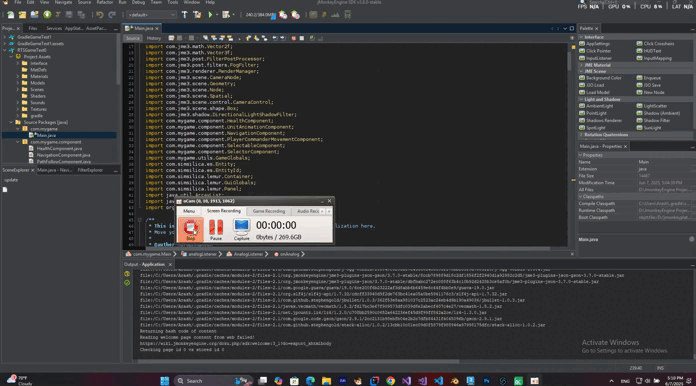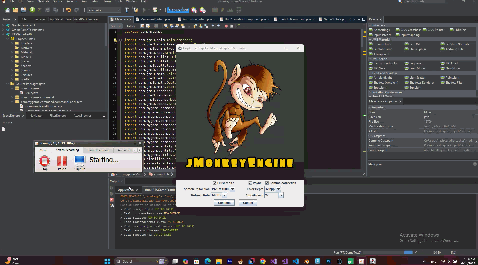AFTER

BEFORE

Environment skills improvement.
https://www.instagram.com/pixelappofficial
https://www.youtube.com/@PixelappOfficial
AFTER

BEFORE

Environment skills improvement.
https://www.instagram.com/pixelappofficial
https://www.youtube.com/@PixelappOfficial
not a real game, but more a demo to test p2p networking (the particles should represent the packets being sent from one peer to the other)
Working on a small testing RTS project for a few days now to test Entity Component System and animations :

@RiccardoBlb
Complimenti per l’ottimo lavoro di grafica e per la UI. Il risultato tecnico è davvero notevole! ![]()
Hi @TesterY,
are you using a custom pathfinding algorithm, or did you integrate a NavMesh library to handle the movement? Could you give us some more details on how it all comes together?
Hello,
I’m using “Recast4j” library for both pathfinding and NavMesh generation.
very impressive, are you planning to add vehicles (tanks and such) by any chance? ![]()
Doing some UI and some improvements. There are some bugs that need to be fix that involves disconnections but are not consistent. The player names use RNG numbers for now.
Thanks you ![]() ,i’m not really sure. i will probably add some vehicles later but as i said i’m just working on this to learn Jmonkeyengine and Entity component system and some other stuffs so whenever i tried to make a real game i don’t need that much code refactors and whatever.
,i’m not really sure. i will probably add some vehicles later but as i said i’m just working on this to learn Jmonkeyengine and Entity component system and some other stuffs so whenever i tried to make a real game i don’t need that much code refactors and whatever.
I Was made this models for a project in cryengine ( i was trying to remake Army men rts). here is a gameplay video :
But now i’m working with Jmonkeyengine mostly because of shaders which is almost impossible to change or work with in CryEngine for me as it’s kinda difficult too while it’s much easier to make a small shader or change it in Jmonkeyengine.(And CryEngine just doesn’t get any updates for a while now.they said they are working on shader editor or something but still nothing.and i’m a java programmer and jmonkeyengine feels kinda good to work with.)
Wow, everyone is working on awesome projects!
Not directly jMonkeyEngine related, but somewhat since the SDK runs on Netbeans, and one of the goals of the plugin was to more easily develop the SDK…
I’ll admit I got a bit carried away by the project I started a while ago. While the intention was to only provide fill in the middle code completion, I went ahead and added instruct type code completion, as well as an AI chat window.
I’ve also added a sort of project wide context through sending the open tab + a summary of imported classes from the same project. This works so much better than copy/pasting to chatgpt.
Now I’ve started using it to develop the plugin. AI all the way down… ![]()
While I wanted to use local models, I didn’t have the patience to wait for responses, so now I’m using Mistral’s API.
I posted about it on reddit a while ago, and the commenters were ecstatic:
Tools/function usage (as in inserting code automatically) is almost working, but I need to refactor it and use automatic json serialization instead of doing it manually).
It’s always a trade-off: Should I work on my projects, or the tools for my projects?
![]()
testing recursive metadata rendering ![]()
one thing im having a bit of trouble is creating a scrollable list to account for when the expanded metadata panels exceed the parent container size, but it looks doable from my understanding ![]()
Scrollable infinite panels within panels is non-trivial to accomplish in Lemur right now. I have a plan to add support for this (after thinking about it for 10 years… I finally think I have a way)… but it’s not there yet.
In your case, you might be able to get away with some clever ViewPort management to show your meta-data… the general solution using ViewPorts is hard but in specific cases where a game use-case has something specific in mind, it’s possible to make it work.
Panel + scroll bar. An app state that manages a veiwport and keeps it located right over that panel’s ‘insides’… then render the scrollable UI in that ViewPort.
(Probably this particular part of the topic is worth a separate thread if that explanation wasn’t enough of a head start.)

Progression of average character.
24 FPS sometimes unplayable. What are your system specs ? GPU ? RAM etc
Looking Good. and I’m impressed with your progress !. Nice to see !!
I’m using a laptop. RTX3050 and 20 GB ram , CPU i5-12500H.
I just tried something new. instead of using bones and Jmonkeyengine animation system you can export all your model animation frames and make your own animation system with those.like that i can have like 10K units with 30 fps.(just keep in mind all this units have components and code that running on all of the each frame all the time and that takes a bit of performance too)
It seems to be working pretty well for an RTS game.because RTS games usually doesn’t have very complex animations.
Here is a demo with 5k units with around 30-40 FPS : (Edited the link)

As i said i can have like 10k units like this but if i use bones and stuff i will probably can’t have more than 1k units in same place.
Yeah, for large numbers of animated units, you have to get creative.
I even imagine you could implement batching if the animation data was compiled into textures… then just one index per object would give the animation frame to use. I’ve always wanted to try it but never had a ‘good reason’ for my own game. (At least not yet…)
Yeah, like this you can have higher poly models too.with a bit of optimization it seems to be very good for an RTS game.(i’m not sure if it works that well for games like Mythruna , because that game has dynamic attachments or whatever it’s called on the characters which i’m not sure this way works that well for those kind of cases).